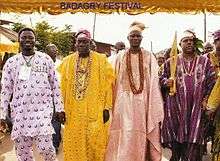Badagry Festival
| Badagry Festival | |
|---|---|
 Anago Prince at the Badagry Festival | |
| Status | active |
| Genre | Festivals |
| Begins | August |
| Ends | August |
| Frequency | Annually |
| Location(s) | Badagry, Lagos State |
| Country | Nigeria |
| Previous event | August 2015 |
| Next event | August 2016 |
| Leader | Oba Akran |
| Organised by | African Renaissance |
| Sponsor | MTN |
| Website | |
| Official Website | |
Badagry Festival is an annual event held in Badagry, a town in Lagos State, Nigeria. The festival is organised by African Renaissance Foundation (AREFO). The event reflects the significance of the ancient town during the slave trade era. It is a convergence of culture and display of African heritage. The organizer brings the indegine and culture loving fans from four corners of the world to celebrate the festival. One of the major highlights of the annual festival is the artistic display by Masquerades, dancers and fire eaters. It also features football competition, beating of Sato drum, Liberation Day Celebration.[1][2][3][4][5][6][7][8]
History
The festival started in 1999 to commemorate end of slave trade era and the significance of the ancient city during the period of slavery. The name Badagry was culled from the means of livelihood of the indigenes of the city which include fishing, farming, salt making. Others believe the city was named after Agbedeh a popular farmer, whose farm was named Agbadarigi, was later rephrases Badagry by the Europeans.[9] In the early eighteen century Badagry serve as a route for the Europeans where slaves were transported to new destination of their buyers. It homes cenotaph "Point of No Return" the well at this place was enchanted to ensure slaves that drink from it forget its destination. At the end of eighteen century, Badagry was one of the route that benefited from the recurrent battle between Portnovo and Dahomey for the movement of slave.[10] Badagry was noted as the auction point for slaves captured during inter-villages warfare.[11] In 1983, Chief Mobee was among the African Chief that partook in the slave trade. The first two-storey building was built in Marina, Badagry in 1845.[12] Presently, the site is facing massive environmental degradation due to lack of maintenance by the government and activities of commercial tree fellers. The government of Babatunde Fashola in their effort to reignite the glory of the city has started the construction of Badagry Express way project, commissioning of Badagry Marina project.[13][14][15][16]
The making of the Festival
The 2015 edition of Badagry festival was tagged[17] "Toussaint L'ouverture: The Catalyst for the struggle for liberation of the black".The event started on 20 August and ended on 30 August in 2015. The festival creates a platform for the reuniting of Nigerian in diaspora to reunite with their motherland.[18] The event was held at Badagry Grammar School, Badagry, Lagos Nigeria.
See also
References
- ↑ Japhet Alakam. "African magic masquerades end badagry festival". Vanguard Nigeria. Retrieved 30 October 2014.
- ↑ Japhet Alakam. "Badagry festival calls for end to modern slavery in Africa". Vanguard Nigeria. Retrieved 30 October 2015.
- ↑ Anote Ajeluorou. "badagry festival 2015 uniting the diaspora with motherland". The Guardian. Retrieved 30 October 2015.
- ↑ PM News. "fanfare at badagry festival". Retrieved 30 October 2015.
- ↑ Premium Times. "Annual Badagry Festival Begins". Retrieved 30 October 2015.
- ↑ Yinka olatunbosun. "Lagos Black Heritage festival 2015 Beckons". Thisday News. Retrieved 30 October 2015.
- ↑ daily independence. "badagry glimpse lagos famous tourist site". Kimberly Okonkwo. Retrieved 30 October 2015.
- ↑ James Walls. "World Mayors Hail Badagry Festival". Vanguard News. Retrieved 30 October 2015.
- ↑ Kinberly Okonjwo. "Badagry Glimpse Lagos Famous Tourist Site". Daily Independence. Retrieved 30 October 2015.
- ↑ Manuel Barcia. West African Warfare in Bahia and Cuba. Oxford University press. Retrieved 30 October 2015.
- ↑ "both side of the same coin". Retrieved 30 October 2015.
- ↑ Luzzie William Mark Shetley. Nigeria. Retrieved 30 October 2015.
- ↑ Premium Mews. "Badagry Slave Route Faces Environmental Degeneration". Prime Time. Retrieved 30 October 2015.
- ↑ Phillip Curtin. The African Slave Trade. University of Wisconsin Press. p. 314. Retrieved 30 October 2015.
- ↑ Both Side of the Same Coin. Retrieved 30 October 2015.
- ↑ Olivier Pétré Grenouilleau. From Slave Trade to Empire. Retrieved 30 October 2015.
- ↑ mybadagry.org. "Objective of Badagry Festival by Sewedo Balogun". viyhon awhanse. Retrieved 30 October 2015.
- ↑ "Badagry Festival". my badagry. Retrieved 30 October 2015.